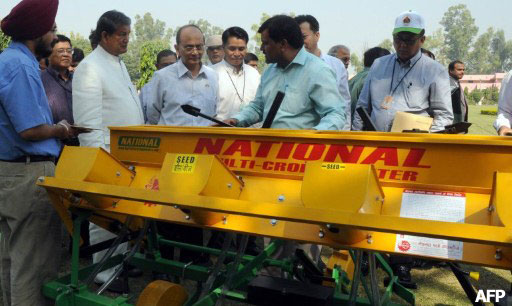(Interview) – Tun Lwin, the chairman of the Myanmar Pulses, Beans and Sesame Seeds Merchants Association, who accompanied President Thein Sein to India says that India is looking for ways to invest in Burma’s agriculture and energy sectors. India also wants to expand airline services between the two countries. India is Burma’s fifth largest trading partner, and it exports more than one million tons of beans annually. However, bilateral trade is not good because of poor transportation, lack of security on the Indo-Burmese border and banking issues. Mizzima correspondent Te Te talks with Tun Lwin about the meetings during the presidential visit, the difficulties in bilateral trade and future prospects.
 Question: During Thein Sein’s visit, what did Burmese businessmen discuss with Indian officials?
Question: During Thein Sein’s visit, what did Burmese businessmen discuss with Indian officials?
Answer: India usually buys more than 70 per cent of our bean production, so we discussed agricultural regarding growing beans and peas and agricultural techniques.
Q: Which companies from India attended the meeting?
A: All companies from many sectors attended. Our chairman Win Aung represented Burma. And Myanmar Rice Industry Association chairman Chit Khaing and I attended. Construction companies included Shwe Than Lwin and Aung Chan Tha; and officials from the Myanmar Fishery Federation also attended the meeting.
Many officials from the Indian side attended the meeting. Transportation companies, construction groups, rice groups and pulses groups came. I think there were about 50 Indian officials. Officials from the agricultural and energy sectors also attended.
Q: What else was discussed by Burmese and Indian officials?
A: They want to buy farmland and conduct “contract farming,” if possible. We discussed that.
Q: What investments do Burmese investors want to make in India?
A: Rather than us investing in India, we’re interested in attracting Indian investments in Burma, and we discussed that. We didn’t discuss making investments in India.
Q: In which sectors does India want to invest?
A: I think they are very interested in the energy sector.
Our ministers have invited them to invest. Economics opportunities have been opened for them.
Q: What other business sectors are Indian companies interested in?
A: They produce many products, but in comparison with some other countries’ products, the products aren’t as profitable for us. They have iron and machinery. We import some products from Thailand, China and other countries because of easy transportation and good quality. Despite the discussion to promote mutual trade, we will import only the products with attractive prices.
Q: Regarding the transportation businesses, what did India say in the meetings?
A: They asked about the airline business. They told us to expand airline services. We discussed matters regarding the airline industry. Another important subject was expanding sea route services.
Q: Which business opportunity did the Burmese side see in India?
A: As a whole, our main export is pulses and beans. The main product imported from India to Burma is medicine. And we also import electrical equipment, iron sheets and construction material. Burmese merchants import those products.
Q: Which is the best business in the mutual trade?
A: Exporting pulses and beans is the best. Burma grows beans as its second most important crop. India usually buys more than one million tons of beans per a year, so this is the major export. We export mung beans, the green gram and pigeon peas.
Q: In comparison with other neighbouring countries, Burma does less import and export with India.
A: Yes, that’s because we are near Thailand and China. There are better transportation routes to Thailand and China. With India, we have problems regarding transportation. On the [Indo-Burmese] border, there are the insurgent groups in Assam, so the area is not stable and it hinders border trade.
Q: What are some of the other problems preventing more trade?
A: Sometimes we have difficulties in transferring money. It’s related to the banking system. Our country has suffered sanctions, so there are difficulties in some sectors.
Sometimes, we cannot directly connect with Indian banks. We need to go through other countries to make and accept payments. So it’s costly and difficult sometimes. Because of sanctions, we have problems in making and receiving payments.



